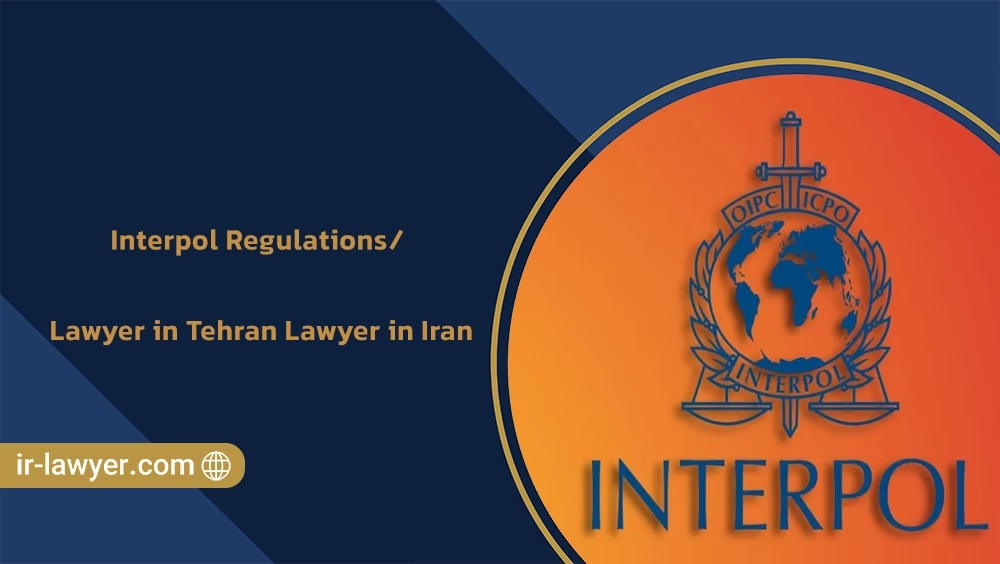
Interpol Regulations/ Lawyer in Tehran Lawyer in Iran
Introduction Due to the expansion of international communications and the ease of travel, Iranian citizens may face legal and judicial restrictions in foreign countries due to a criminal ruling issued in Iran.
One of the key organizations in this regard is INTERPOL, or the International Criminal Police Organization, headquartered in France. INTERPOL works to track down individuals introduced as criminals by Iran, who in some cases may have been sentenced in absentia. Through its representative offices in various countries, including the UAE and Turkey, INTERPOL arrests and extradites convicts to Iran.
Khalil Asayesh, an INTERPOL lawyer with 15 years of specialized experience, states: “Nowadays, individuals are pursued by INTERPOL for various reasons. Some cases arise from private complaints, while others stem from public prosecutions. In many instances, the accused is tried in absentia, meaning they were not present in court to defend themselves, leading to a conviction.
The complainant then approaches INTERPOL to seek their arrest and extradition. If someone is pursued, depending on the nature of the crime and the sentence issued by the Iranian court, different notices, including the Red Notice, may be issued against them, requesting other countries to identify and detain them.” What is evident and crucial in INTERPOL cases is the presence of two parties, each presenting their claims and defenses.
The applicant seeks the enforcement of INTERPOL’s request for the arrest of the convict, while the convict aims to legally challenge the ruling, arguing procedural deficiencies and violations of due process to prevent their arrest and extradition. Thus, it is essential for a lawyer to be well-versed in the legal regulations of the country where the convict resides (the foreign country).
The role of a lawyer in an INTERPOL case is even more significant than that in the primary case itself. It is important to note that INTERPOL has uniform rules and regulations across its member states. The UAE, as an INTERPOL member, has its own procedures for enforcing judgments and extradition requests.
The UAE authorities scrutinize and carefully evaluate these cases. An INTERPOL extradition request alone is not sufficient for the UAE to extradite a suspect or convict, as both the Ministry of Justice, the Ministry of Foreign Affairs, and the police must be convinced before executing an INTERPOL order. Therefore, executing an INTERPOL order in the UAE or obstructing its execution requires significant experience and a thorough understanding of UAE governmental institutions. A lawyer must have deep knowledge of the Ministry of Justice, police, and Ministry of Foreign Affairs of the UAE to effectively represent either the complainant or the accused. With years of experience in enforcing Iranian court rulings in the UAE and handling INTERPOL orders in the region, I, Khalil Asayesh, am fully prepared to provide legal assistance in such cases.

If you are facing INTERPOL-related issues or want to check your INTERPOL status, you can consult with Khalil Asayesh, who operates in both the UAE and Iran, specializing in legal fields such as the enforcement of foreign court rulings and the extradition of criminals in various countries. INTERPOL Lawyer in Iran and UAE INTERPOL Lawyer in Dubai and UAE When facing an international alert, it is crucial to seek assistance from an experienced INTERPOL lawyer. An INTERPOL lawyer helps you understand INTERPOL notices (such as Red and Blue Notices) and advises on how to respond in case of a Red Notice, as the consequences of temporary arrest and extradition can be severe, potentially damaging your career and personal reputation.
Additionally, INTERPOL laws are complex as they involve multiple jurisdictions. If you need specialized legal consultation regarding INTERPOL and making informed decisions, you can contact me, Khalil Asayesh, via direct call or WhatsApp. Before hiring an INTERPOL lawyer, ensure that you review their written resume to avoid making an incorrect choice. Key Questions Regarding INTERPOL Orders Khalil Asayesh, an INTERPOL lawyer, explains: “In many cases, individuals are convicted in Iran due to financial or criminal charges and may legally or illegally travel to a foreign country before or after sentencing.
This raises concerns about how Iranian court rulings affect their lives abroad. Can they be extradited through INTERPOL or an extradition treaty?” Will a person with a Red Notice be detained if traveling through an airport? Which countries disregard INTERPOL Red Notices? Can the judiciary of the country where the person resides immediately arrest or extradite them, or must they conduct a hearing to review the allegations and defense statements before making a decision? Upon arrest, is the person’s passport confiscated or are they banned from leaving the country? It is essential to consult with an INTERPOL lawyer specializing in extradition to understand your legal options. An experienced lawyer can help defend against an INTERPOL order and extradition requests. The lawyer’s experience outside Iran is a crucial factor in choosing an INTERPOL specialist, as they must be familiar with international and foreign laws and have practical experience representing clients abroad. How to Choose an INTERPOL Lawyer When selecting a lawyer for INTERPOL cases, their experience handling similar cases is critical.
A lawyer with a proven track record in international law, extradition, and contesting Red Notices should be preferred. Reviewing a lawyer’s resume is essential before making a decision. Khalil Asayesh states: “An experienced INTERPOL lawyer can assess the validity of a Red Notice, identify potential violations, and file a legitimate request to remove an unlawful notice from INTERPOL’s CCF (Commission for the Control of INTERPOL’s Files).
Reviewing past successful cases, especially those where Red Notices were canceled, is crucial. With my expertise, I know how to gather the necessary evidence, determine required documents, and provide a precise risk assessment for arrest or extradition, thereby increasing the chances of a successful defense.” The Process of Issuing a Red Notice in INTERPOL After receiving a request, INTERPOL’s General Secretariat publishes notices based on requests from national central bureaus. INTERPOL’s website may also publish summaries of notices upon request from member countries or international bodies. If you do not see your name on INTERPOL’s website, it does not necessarily mean you are not on the INTERPOL list. Additionally, the General Secretariat can only issue a notice if all legal conditions are met. INTERPOL Red Notices are international alerts used by law enforcement to communicate information about crimes, criminals, and threats. They are issued at the request of a country or an authorized international entity and sent to all member states.
These notices provide details on wanted persons for serious crimes, missing individuals, unidentified bodies, escapees, and criminal methodologies. INTERPOL’s dedicated team reviews all Red Notice requests to ensure compliance with its Constitution and rules. This team consists of multilingual legal experts, police officers, and operational specialists who sometimes make mistakes. An INTERPOL lawyer can identify and challenge such errors to seek the cancellation of a Red Notice. The legal basis for a Red Notice is a warrant or court order issued by judicial authorities in a country. Many INTERPOL member states consider a Red Notice as a valid request for provisional arrest unless proven otherwise. INTERPOL also serves as a formal channel for transmitting extradition requests under various bilateral and multilateral treaties, including the European Extradition Convention, the ECOWAS Extradition Treaty, the UN Model Extradition Treaty, and the Gulf States Extradition Convention.




